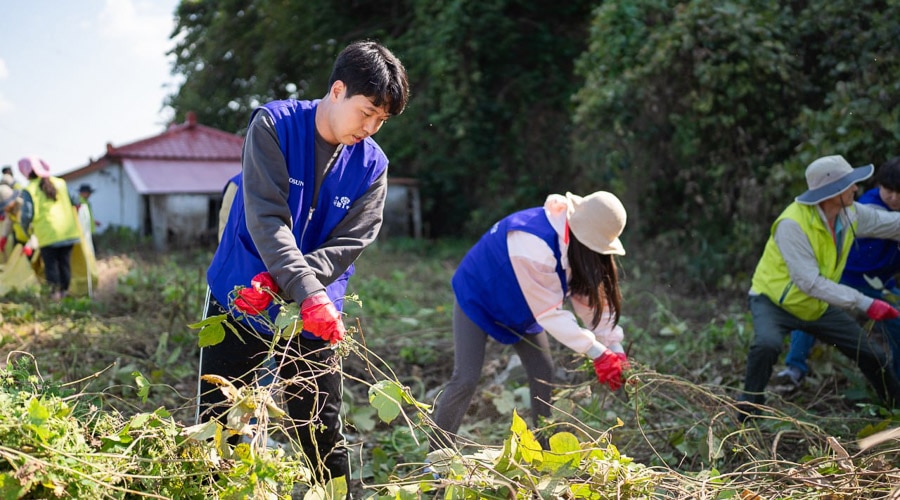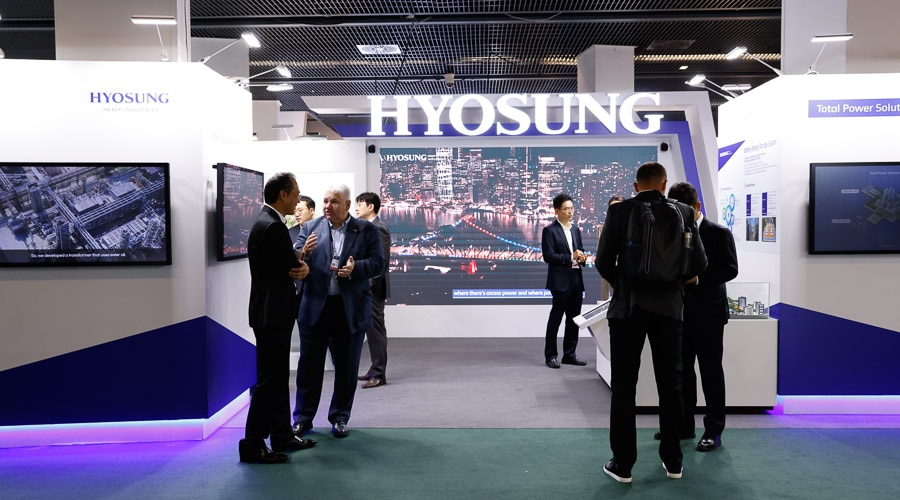Content content
In the past, our ancestors would leave a few ripe persimmons on the tree while harvesting. These leftover fruits, called "magpie food," provided sustenance for birds during the harsh winter months—a wise gesture of coexistence with nature. However, today’s environmental pollution and global warming have severely disrupted ecosystems, placing a million species on the brink of extinction. Many cherished plants and animals we’ve known might soon vanish forever.
Biodiversity: A New Pillar of ESG Management
In December 2022, the 15th UN Biodiversity Conference (COP15) adopted the ‘Kunming-Montreal Global Biodiversity Framework,’ marking an international commitment to halt and reverse biodiversity loss by 2030. Through this framework, the UN and the global community pledged to conserve and manage 30% of the world’s terrestrial and marine areas and allocate at least USD 200 billion annually (approximately KRW 250 trillion) to restore biodiversity. As a result, the focus of ESG management has expanded beyond addressing climate change to include biodiversity preservation. The growing awareness of biodiversity loss has also prompted more companies and organizations to take action to restore ecological balance.
Alongside this shift, the concept of natural capital has gained traction. Natural capital refers to the economic, environmental, and social benefits derived from nature and ecosystems. Industries such as agriculture, fisheries, and forestry, as well as sectors like food production and construction, are deeply reliant on natural capital and vulnerable to its depletion. For instance, the decline of pollinators like bees has had a significant impact on food production. Recognizing such risks, the Taskforce on Nature-related Financial Disclosures (TNFD)—a global coalition involving 1,100 companies from 58 countries—released its final recommendations for a ‘Nature-Related Capital Disclosure Framework’ in September 2023. Over 300 global corporations have committed to adhering to TNFD’s framework, underscoring the critical importance of safeguarding natural capital.
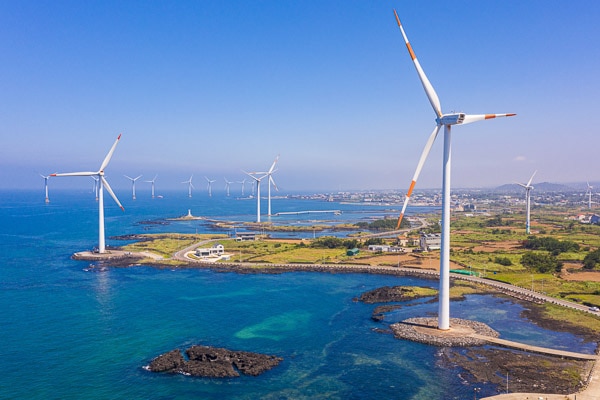
Biodiversity is increasingly shaping the investment landscape as well. In early 2024, S&P Dow Jones Indices launched the S&P 500 Biodiversity Index and the S&P Global LargeMidCap Biodiversity Index. These indices evaluate and include companies from existing benchmarks based on their commitment to environmental and biodiversity goals. The aim is to promote responsible investment practices that prioritize ecological sustainability.
The World Economic Forum predicts that the biodiversity market will grow to approximately USD 70 billion (KRW 93 trillion) by 2050. Reflecting this trend, biodiversity funds are rapidly expanding. In February 2024, UK-based alternative investment manager Gresham House partnered with global advisory firm Willis Towers Watson (WTW) to introduce a biodiversity fund. This initiative was the first of its kind to directly link corporate biodiversity offset efforts to financial returns, creating significant buzz in the UK capital market.
In December 2023, South Korea’s Cabinet meeting approved ‘the 5th National Biodiversity Strategy (2024–2028).’ The plan, designed as a top-level, cross-ministerial initiative, aims to conserve biodiversity and promote sustainable use. A cornerstone of the strategy is designating 30% of the nation’s land as biodiversity protection zones by 2030. By implementing this strategy, South Korea seeks to fulfill its international obligations while fostering economic benefits through the shared value of nature within local communities.
HYOSUNG Affiliates Committed to Biodiversity Conservation
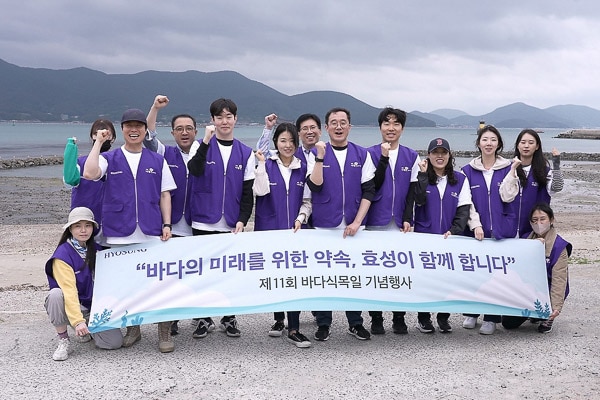
▲ HYOSUNG is leading efforts in marine environmental protection, including seagrass forest cultivation and coastal ecosystem restoration.
HYOSUNG actively contributes to global biodiversity conservation efforts. Notably, since December 2022, HYOSUNG became the first private company to participate in the national seagrass forest cultivation project. ‘Seagrass,’ a key marine-protected species representing blue carbon (a natural carbon sink), reduces approximately 4.7 tons of carbon annually per hectare of habitat. In May 2023, HYOSUNG signed an MOU with the Ministry of Oceans and Fisheries and the Korea Fisheries Resources Agency to expand its efforts in preventing marine desertification and reducing carbon emissions.
In 2024, HYOSUNG partnered with Wando County and the Korea Fisheries Resources Agency through a carbon neutrality and marine ecosystem conservation agreement, actively engaging in initiatives to improve the marine environment. As part of these initiatives, the company transplanted 2,000 seagrass shoots in the waters near Donggori, Wando County, during May’s Marine Planting Day and conducted a coastal cleanup. These actions highlight HYOSUNG’s dedication to protecting marine ecosystems and supporting local communities.
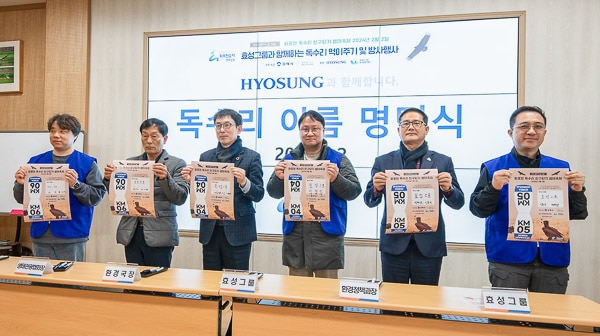
▲ HYOSUNG has supported a project that provides domestically produced agricultural and livestock products to migratory birds in the Hwapocheon Wetland since November 2023.
HYOSUNG is also dedicating meticulous efforts to protecting winter migratory birds. In February 2024, in celebration of World Wetlands Day, three eagles that had been protected and treated at the Hwapocheon Wetland in Gimhae were released, and feeding support was provided for endangered winter migratory birds, including species designated as natural monuments. This project, which began in 2023, aims to protect migratory birds from starvation and safeguard the ecosystem.
In addition, in 2023, HYOSUNG visited the Yeongyang and Uljin regions in Gyeongbuk, home to endangered species such as the first-class endangered wild animal, the mountain goat. The company installed protective metal fences for small-scale farmers to reduce damage caused by low-cost nets in the area, thus preventing harm to wildlife.
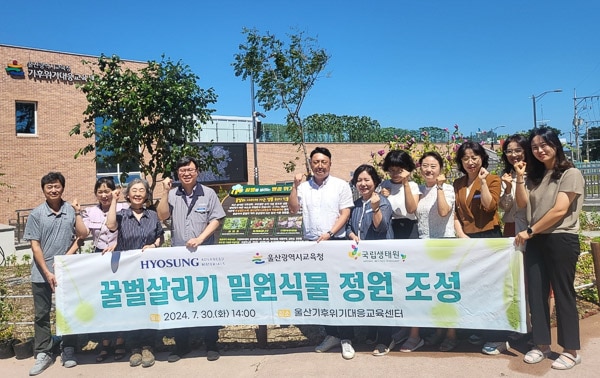
▲ In July 2024, HS Hyosung Advanced Materials created an endangered species honey plant ecological learning garden at the Ulsan Climate Crisis Response Education Center.
HS Hyosung Advanced Materials created pollinator gardens using endangered plant species at both the Mullbeodeul Eco-Experience Learning Center in Seocheon, Chungnam, and the Ulsan Climate Crisis Response Education Center, contributing to the increase of bee populations. The company also worked on the planting of the second-class endangered species, Jeonju Water Knotweed, in Giri Park in Jeonju, and has been involved in various initiatives.
Community collaboration has also been achieved. In early 2024, the Dalseong Wetland in Daegu, where Hyosung TNC operates, was designated as a biodiversity conservation area, and efforts were focused on protecting the ecosystem. The Dalseong Wetland, home to a variety of plant and animal species, is regarded as one of the most ecologically valuable sites in South Korea. HYOSUNG supported the "Biodiversity Festival" held at the wetland, successfully running citizen participation programs. Additionally, the company is building a network of citizens and experts through support for nature schools and the creation of a biodiversity exploration report guidebook.
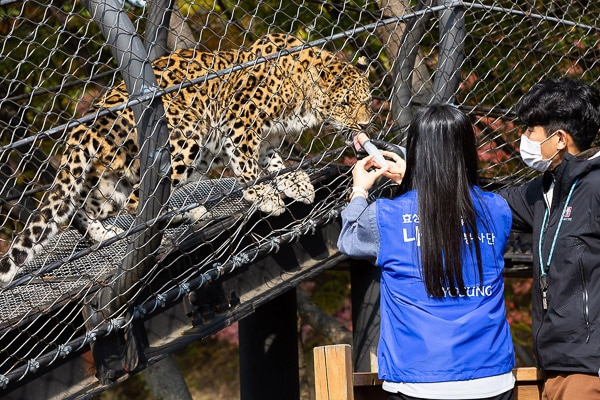
▲ In October 2022, employees of Hyosung Chemical's Oksan Plant engaged in biodiversity conservation activities at Cheongju Zoo.
Hyosung Chemical has also extended a helping hand to animals that have lost their natural wildness. In 2022, the company collaborated with Cheongju Zoo, a captive breeding institution, to implement an animal behavior enrichment program. This program helped endangered species such as the Asiatic Black Bear and Himalayan Tahr live in environments that closely resemble their natural habitats. The team even created special meals from pumpkins and kudzu vines to encourage natural, active behaviors. For these efforts, Hyosung Chemical, along with HS Hyosung Advanced Materials, was recognized in the "Endangered Species Conservation Sponsorship Recognition Program" by the National Institute of Ecology under the Ministry of Environment in 2023.
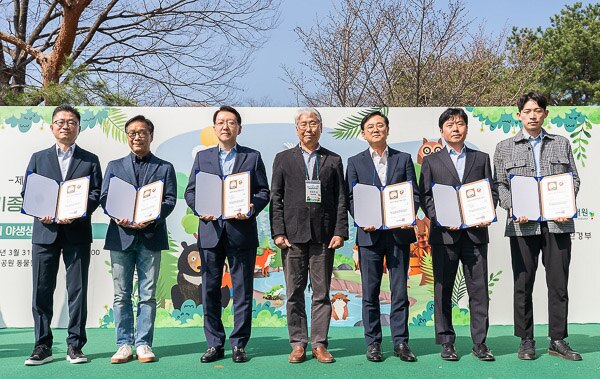
▲ In March 2023, Hyosung Chemical and HS Hyosung Advanced Materials were recognized as sponsor companies in the "Endangered Species Conservation Sponsorship Recognition Program."
HYOSUNG employees and their families have also joined in. In Changwon, around 80 employees and their families from Hyosung Heavy Industries visited one of the "kidneys of nature," the Tteunnyeup Wetland in Haman-gun, where they created resting areas and participated in environmental education. Additionally, the company has been protecting habitats through the "One Company, One River Cleanup" initiative, which focuses on removing harmful plants.
Chairman Cho Hyun-joon has stated, "An environment where biodiversity is preserved is the foundation of a company and the goal of sustainable development." In line with this vision, HYOSUNG is actively exploring new and genuine methods for ecosystem conservation, ensuring that future generations and local communities can benefit from a healthier environment. Please continue to support and follow HYOSUNG’s biodiversity conservation efforts for a better tomorrow and a healthier planet.
